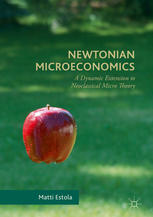

Most ebook files are in PDF format, so you can easily read them using various software such as Foxit Reader or directly on the Google Chrome browser.
Some ebook files are released by publishers in other formats such as .awz, .mobi, .epub, .fb2, etc. You may need to install specific software to read these formats on mobile/PC, such as Calibre.
Please read the tutorial at this link: https://ebookbell.com/faq
We offer FREE conversion to the popular formats you request; however, this may take some time. Therefore, right after payment, please email us, and we will try to provide the service as quickly as possible.
For some exceptional file formats or broken links (if any), please refrain from opening any disputes. Instead, email us first, and we will try to assist within a maximum of 6 hours.
EbookBell Team

4.0
16 reviewsPresenting the dynamic laws of economic quantities, this book tackles one of the core difficulties of current economic theory: that of transforming abstract equations of equilibrium into precise dynamic rules. The theoretical framework of neoclassical micro theory has historically prohibited its development into a quantitative science. Estola identifies the main weaknesses of this framework as follows: 1) Static optimization does not allow for the modelling of time-dependent production and consumption flows; 2) The assumption of optimal behaviours forecloses any understanding of changes in economic quantities, as none will change its optimal behaviour. The author of this title assumes that economic units tend to better their situation where possible. The book demonstrates how this approach leads to an analogous framework in economics to the Newtonian framework in physics. The ‘forces’ acting upon economic quantities, which either cause adjustment toward an equilibrium state or keep the system in motion with time, are defined such that the neoclassical framework corresponds to a ‘zero-force’ situation. Introducing a system of measurement units for economic phenomena, Estola applies this throughout, and thereby illuminates a way for microeconomics to meet the minimum requirements of quantitative analysis.